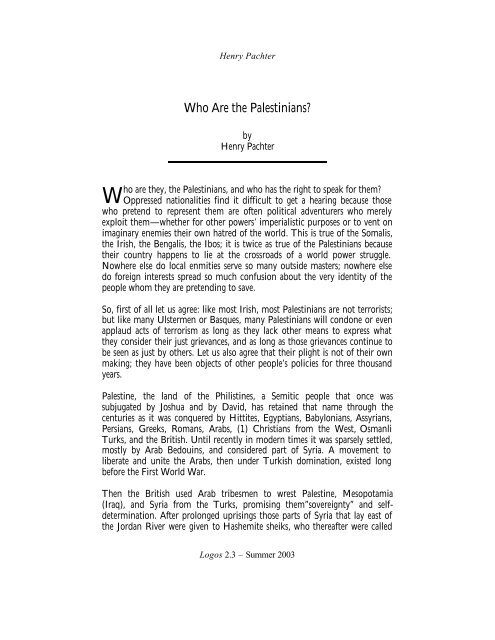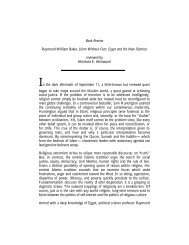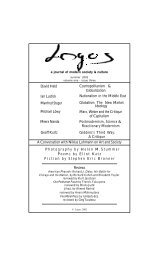Michael J. Thompson Stephen Eric Bronner Wadood Hamad - Logos
Michael J. Thompson Stephen Eric Bronner Wadood Hamad - Logos
Michael J. Thompson Stephen Eric Bronner Wadood Hamad - Logos
Create successful ePaper yourself
Turn your PDF publications into a flip-book with our unique Google optimized e-Paper software.
W<br />
Henry Pachter<br />
Who Are the Palestinians?<br />
by<br />
Henry Pachter<br />
ho are they, the Palestinians, and who has the right to speak for them?<br />
Oppressed nationalities find it difficult to get a hearing because those<br />
who pretend to represent them are often political adventurers who merely<br />
exploit them—whether for other powers’ imperialistic purposes or to vent on<br />
imaginary enemies their own hatred of the world. This is true of the Somalis,<br />
the Irish, the Bengalis, the Ibos; it is twice as true of the Palestinians because<br />
their country happens to lie at the crossroads of a world power struggle.<br />
Nowhere else do local enmities serve so many outside masters; nowhere else<br />
do foreign interests spread so much confusion about the very identity of the<br />
people whom they are pretending to save.<br />
So, first of all let us agree: like most Irish, most Palestinians are not terrorists;<br />
but like many Ulstermen or Basques, many Palestinians will condone or even<br />
applaud acts of terrorism as long as they lack other means to express what<br />
they consider their just grievances, and as long as those grievances continue to<br />
be seen as just by others. Let us also agree that their plight is not of their own<br />
making; they have been objects of other people’s policies for three thousand<br />
years.<br />
Palestine, the land of the Philistines, a Semitic people that once was<br />
subjugated by Joshua and by David, has retained that name through the<br />
centuries as it was conquered by Hittites, Egyptians, Babylonians, Assyrians,<br />
Persians, Greeks, Romans, Arabs, (1) Christians from the West, Osmanli<br />
Turks, and the British. Until recently in modern times it was sparsely settled,<br />
mostly by Arab Bedouins, and considered part of Syria. A movement to<br />
liberate and unite the Arabs, then under Turkish domination, existed long<br />
before the First World War.<br />
Then the British used Arab tribesmen to wrest Palestine, Mesopotamia<br />
(Iraq), and Syria from the Turks, promising them”sovereignty” and selfdetermination.<br />
After prolonged uprisings those parts of Syria that lay east of<br />
the Jordan River were given to Hashemite sheiks, who thereafter were called<br />
<strong>Logos</strong> 2.3 – Summer 2003




